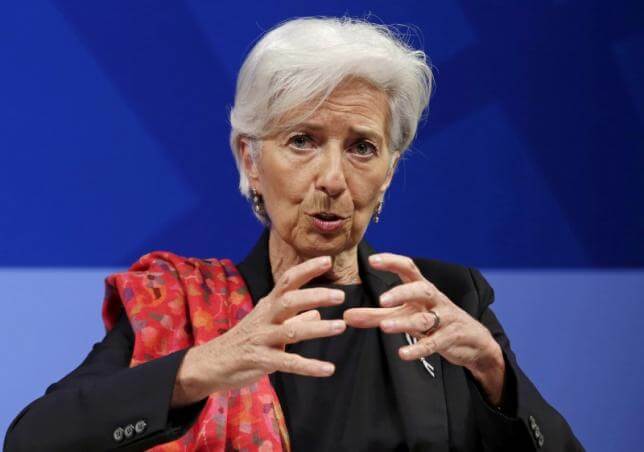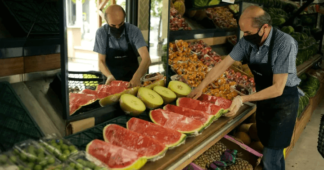Apr. 12, 2024
The fourth most expensive country worldwide in terms of food prices is Greece the latest report by the the Organization for Economic Cooperation and Development (OECD) said.
According to OECD, food inflation stood at 6.7% in February from 8.3% in January.
This means that the government’s measures to combat high prices are not working at all.
There was a decrease in energy inflation (2.1% in February and 5.7% in January), while the general inflation index decreased slightly, from 3.1% in the first month of 2024 to 2.9%.
OECD global report
However, in the countries monitored by the OECD, overall inflation remained unchanged at 5.7%. Indeed, according to the relevant announcement:
● Core inflation fell in three-quarters of OECD countries, with the largest monthly declines in Poland and Sweden and the largest increases in Turkey.
● Headline inflation was below 2% in seven OECD countries and remained negative in Costa Rica.
● Food inflation continued to decline for a 15th consecutive month, reaching 5.3% in February, from 6.3% in January, and rose in only four OECD countries.
● OECD food inflation was below headline inflation for the first time since November 2021.
● OECD energy inflation rose but remained moderately negative at -0.5% in February, despite strong energy inflation in Turkey and Colombia.
● Core OECD inflation (inflation less food and energy) continued to ease but remained high at 6.4% reflecting firm service prices.
● In the euro area, annual inflation, as measured by the Harmonized Index of Consumer Prices (HICP), fell to 2.6% in February, compared to 2.8% in January.
● The decline in food inflation was about twice that of the OECD, while core inflation declined at a similar rate to the OECD.
In March 2024, Eurostat’s preliminary estimate showed another fall in euro area (to 2.4%) and core inflation (to 2.9% from 3.1% in February), with a slowdown in the case of energy.
Greek government
But while all this is happening in the eurozone, the government in Greece creates its own narrative and went from “imported inflation” to “climate crisis in order to justify the high prices.
Development Minister Kostas Skrekas went so far to claim recently that the government measures are paying off and that “in the last month in some supermarket chains, inflation has dropped to 0.4%.” [I wouldn’t know we measure inflation in specific shops/chains lol]
But it does not mention the fact that Greece is among the countries with the highest inflation in Europe, which recorded a further increase in March, according to Eurostat, while according to ELSTAT 26% of the population of Greece is facing the risk of poverty .
It does not make any major interventions nor does it see anywhere an oligopolistic structure in any sector, even when the Bank of Greece clearly says that “we have oligopolies in food, fuel, banking and private hospital care”!
Governor of the Central Bank of Greece, Yiannis Stournaras, in his annual report on the Greek economy clearly said that “the increase in consumer prices exceeded the rise in energy costs and, consequently, inflation is to some extent due to increased business profits” and pointed out to ”
The fourth most expensive country on the planet in terms of food is Greece according to the Organization for Economic Co-operation and Development, which means that the measures to tame the accuracy are not working at all! Food inflation in our country is running without brakes, as in February it stood at 6.7% from 8.3% in January 2024, according to the OECD.
Of course, we also saw a decrease in energy inflation (2.1% in February and 5.7% in January), while the general inflation index decreased slightly, from 3.1% in the first month of 2024 to 2.9%.
However, in the countries monitored by the OECD, overall inflation remained unchanged at 5.7%. Indeed, according to the relevant announcement:
● Core inflation fell in three-quarters of OECD countries, with the largest monthly declines in Poland and Sweden and the largest increases in Turkey.
● Headline inflation was below 2% in seven OECD countries and remained negative in Costa Rica.
● Food inflation continued to decline for a 15th consecutive month, reaching 5.3% in February, from 6.3% in January, and rose in only four OECD countries.
● OECD food inflation was below headline inflation for the first time since November 2021.
● OECD energy inflation rose but remained moderately negative at -0.5% in February, despite strong energy inflation in Turkey and Colombia.
● Core OECD inflation (inflation less food and energy) continued to ease but remained high at 6.4% reflecting firm service prices.
● In the euro area, annual inflation, as measured by the Harmonized Index of Consumer Prices (HICP), fell to 2.6% in February, compared to 2.8% in January.
● The decline in food inflation was about twice that of the OECD, while core inflation declined at a similar rate to the OECD.
In March 2024, Eurostat’s preliminary estimate showed another fall in euro area (to 2.4%) and core inflation (to 2.9% from 3.1% in February), with a slowdown in the fall in energy.
“They measure up!”
But while all this is happening, in our own country the government is fussing about other things… and from “imported inflation” it is now moving to “climatic inflation” to justify the accuracy! In fact, the Minister of Development, Kostas Skrekas, claims that the measures against punctuality that the government has adopted are paying off, as, as he said, “in the last month in some chains, inflation has dropped to 0.4%”.
But it does not mention the fact that Greece is among the countries with the highest inflation in Europe, which recorded a further increase in March, according to Eurostat, while according to ELSTAT 26% of the population of Greece is facing the risk of poverty .
It does not make any major interventions nor does it see anywhere an oligopolistic structure in any sector, even when the Bank of Greece clearly says that “we have oligopolies in food, fuel, banking and private hospital care”!
In particular, the head of the Central Bank of Greece, Yiannis Stournaras, in his annual report on the Greek economy clearly says that “the increase in consumer prices exceeded the rise in energy costs and, consequently, inflation is to some extent due to increased business profits”. He pointed out that there is “a large increase in profit margins.”
For the years 2021 and 2022, the rates of change of the profit margin index for the entire economy exceeded their historically high levels, registering an increase of 4% and 9% respectively.
Unfair profiteering
This situation is also evident in society, since wherever consumers look, they see prices skyrocketing… The milk sold in Grece has the second most expensive price in all of Europe, after Estonia. However, cow’s milk leaves the producers at prices ranging from 0.48 euros to 0.52 euros per liter.
The price of brand fresh milk ranges from 1.49 euros to 2.29 euros per liter in Greece, while in Germany one liter of brand fresh milk costs 1.02 euros, in Spain 1.08 euros and in Portugal 1.01 euros .
The huge producer-to-shelf price discrepancy combined with the increase in industry profit margins, which exceeded 25% in 2020 – 2021, show how unfair profiteering on the backs of consumers continues.
In terms of fuel, Greece is the second most expensive country in the Eurozone. The sector sees a new increase in gasoline expected towards the Greek Orthodox Easter on May 5.
The price of meat has also jumped, since, according to Eurostat: beef has increased by 4.5%, pork by 7.9% and lamb by 7.2%, thus ranking Greece as the sixth most expensive country in the European Union.
If all this is added to the fact that Greece has one of the lowest wages in the EU, then the food prices are like a noose around the neck of Greek citizens.
In the last two years the average real salary has decreased in Greece by 9.4%, while overall in the EU decreased by 5.3%.
source: topontiki.gr
We remind our readers that publication of articles on our site does not mean that we agree with what is written. Our policy is to publish anything which we consider of interest, so as to assist our readers in forming their opinions. Sometimes we even publish articles with which we totally disagree, since we believe it is important for our readers to be informed on as wide a spectrum of views as possible.











